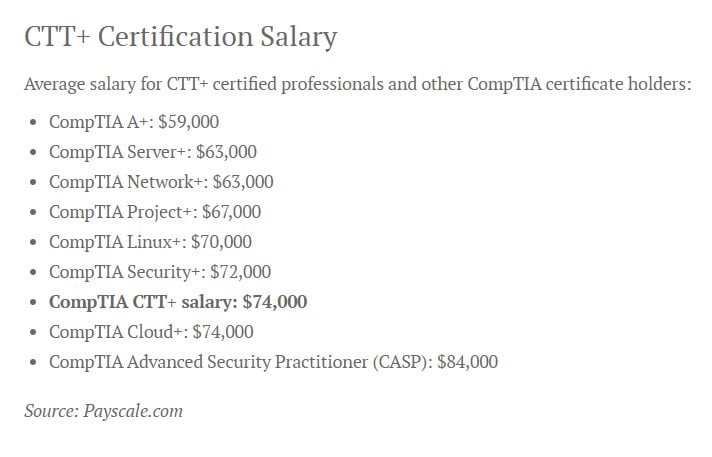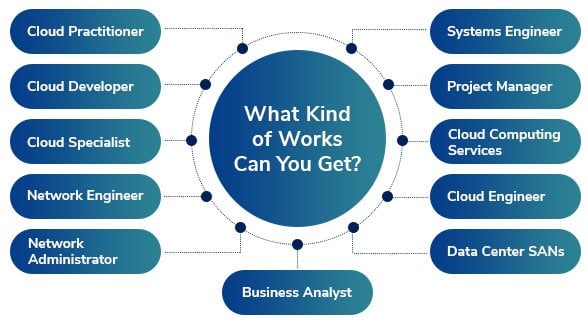Map Your Career Ahead With This Complete CompTIA Certification Guide!
One of the best ways to step-up in your career ladder is by getting certified in specialization areas. In the IT sector specifically, certifications are even more crucial owing to the competitiveness and ever-evolving trends. Employers prefer hiring candidates who have relevant certifications to back up their expertise. This applies to both IT professionals wanting to upgrade their resume, and freshers in the sub-fields of computer security, server environment, and system administration.
While starting a career in IT, a relevant certification can help you develop domain-specific problem-solving skills along with the ability to think critically. In a contemporary and dynamic landscape, those qualities will give you an upper hand over others competing for the same job roles.
Of relevance here, is CompTIA - a world-renowned, non-profit trade association headquartered in Chicago that offers valuable industry-recognized certifications. This is a comprehensive guide about the various IT certifications CompTIA offers and how you can leverage them to forge your career ahead.
CompTIA Certification Overview
CompTIA focuses on educating and certifying IT professionals with the help of international focus groups and IT leaders from various corners of the world. CompTIA certifications are one of the most reliable credentials in the IT niche that are built to suit your convenience.
All certifications under CompTIA come in an easy-to-learn format. You can opt for either self-study or instruction-based learning depending on accessibility and your learning style. CompTIA IT certifications equip IT professionals with real-world skills crucial for gaining success when working in dynamic IT infrastructures.
CompTIA IT certifications don’t only focus on vendor-specific hardware and software. That allows learners to build a robust tech knowledge foundation and understand the industry terminology irrespective of which direction they would go in the future.
CompTIA Certifications
Currently, CompTIA IT certifications fall under four categories grouped by skillset ranging from entry-level to an expert:
- Core
- Infrastructure
- Cybersecurity
- Additional professional
Each of these levels has different certifications as envisioned in the CompTIA Certification Roadmap. CompTIA believes that IT professionals develop their skills in three categories starting from Core to Infrastructure and then to Cybersecurity.
Let’s explore each of these levels and concerned certifications in detail.
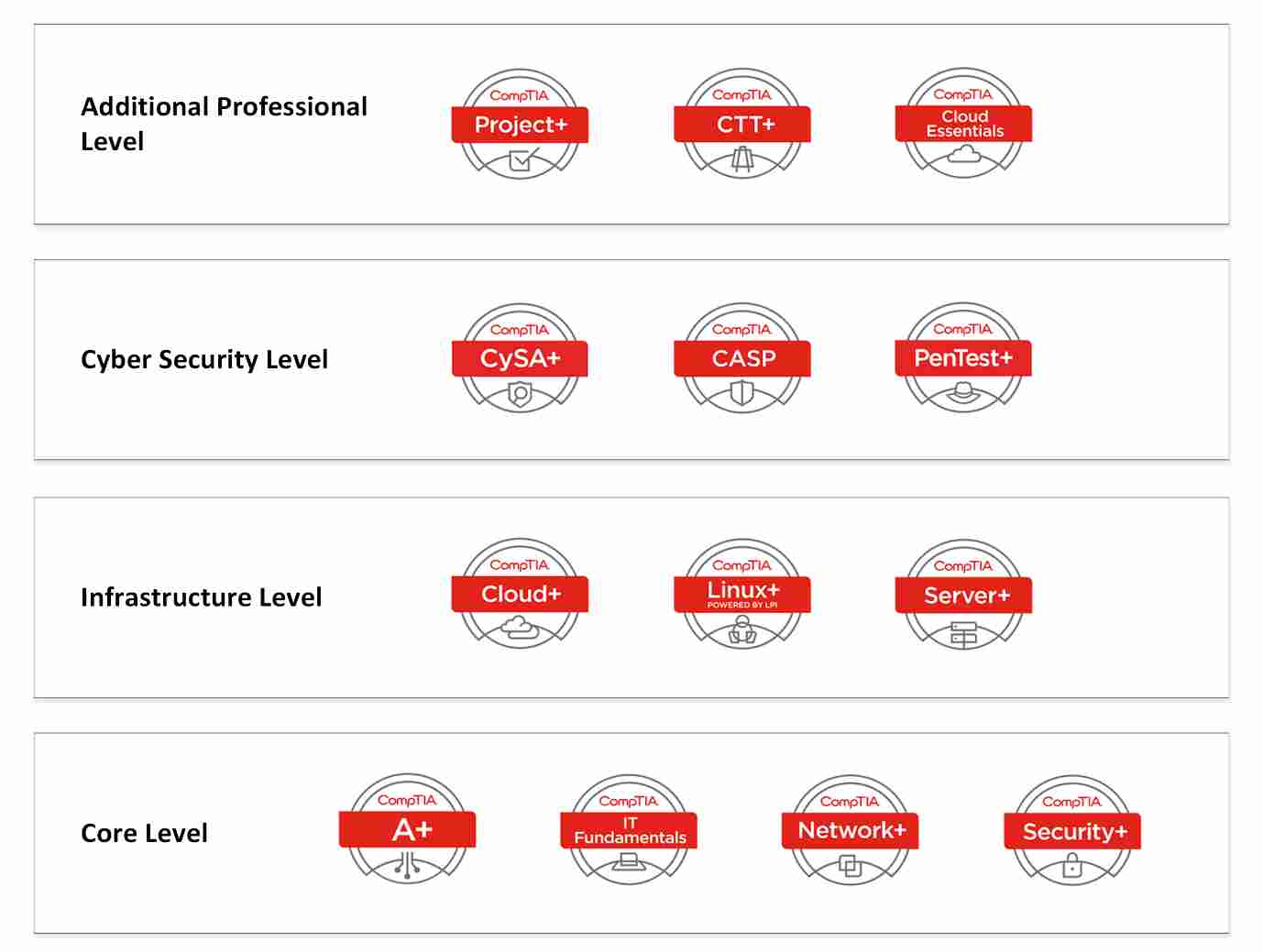
CompTIA Core Certifications
CompTIA certifications comprise four certifications CompTIA F+, CompTIA A+, CompTIA Network+, CompTIA Security+ that are suitable for fresher IT candidates:
I. CompTIA IT Fundamentals Certification
CompTIA IT Fundamentals+ or ITF+ is an introduction to the basics of IT know-how, terminologies, skills, and concepts. This course is designed for students and aspirants who want to start exploring their career in the IT niche. For sales, marketing, or business professionals who work in close alignment with information technology, this certification is a good starting point.
ITF+ helps learners in getting familiar with the following topics:
- IT infrastructure
- Computing
- Database use
- Software development
.png)
Indeed.com
To earn the CompTIA IT Fundamentals+ certification you need to clear an exam which is CompTIA IT Fundamentals+ (FC0-U61). This exam is recommended for individuals who are advanced end-users and are comfortable in working with networks or computers.
Having a basic idea of PC functionality and an understanding of key concepts such as networking, software installation and hardware fundamentals helps to clear the ITF+ exam. With the CompTIA ITF+, it becomes easier to get entry-level job roles such as information Technology intern, IT technician, and information technology specialist.
II. CompTIA A+ Certification
CompTIA A+ Certification is for the individuals who are at the doorstep of building an IT career. The course is planned to facilitate acquiring expertise in problem-solving and get hold of core technologies such as security, data management, and cloud computing. Being a vendor-neutral certification CompTIA A+ complements other renowned certifications such as Microsoft’s MCSA and Cisco’s CCNA.
CompTIA A+ certification is recognized by all the companies for hiring entry-level support candidates. It opens the door to grab job offers with the best perks by boosting a candidate’s ability to:
- Recognize, leverage, and connect hardware devices and components.
- Troubleshoot PC, network issues, and mobile devices including application security support.
- Get familiar with Mobile OS, Linux, and Mac OS.
- Gain expertise in installing and supporting Windows OS along with the knowledge of command line and client support.
- Understand how to install and configure laptops and mobile devices.
- Get a complete idea of the type of networks such as SOHO, TCP/IP, and WIFI.
CompTIA A+ 220-1001 and CompTIA A+ 220-1002 are the two exams that you need to pass for earning the CompTIA A+ certification. There are no prerequisites to clear this exam, but CompTIA suggests that the applicants should have at least 9-12 months of experience in technologies like network troubleshooting, hardware, software troubleshooting, networking technology, mobile devices, expanded security, virtualization and cloud computing.
III. CompTIA Network+ Certification
Most of the IT professionals begin their CompTIA journey with A+ certification but if you have the basic entry-level experience experts recommend choosing CompTIA Network+ certification. The candidate gains expertise in the network administration niche which is a valuable experience for any IT professional.
CompTIA Network+ certification validates the crucial skills required to design, configure, manage, and troubleshoot wireless and wired devices by allowing candidates to learn:
- Relevant cabling, storage, and device technologies.
- Sum-up common threats and physical security while protecting the wired and wireless network.
- Objectives of different networking concepts and their implementation protocols.
- Network troubleshooting processes and the right tools to facilitate seamless performance and connectivity.
- Best practices to control the network, sustain business continuity, and establish policies.
You can earn the CompTIA Network+ certification by passing the CompTIA Network+ (N10-007) exam which is suitable for professionals who have a networking experience of a minimum of 9-12 months. This certification is accepted in MNCs like Dell, Intel, HP, and Apple Consultants Network.
IV. CompTIA Security+ Certification
CompTIA Security+ certification is appropriate for security professionals and IT administrators as it covers a wide range of areas such as identity management, network security concepts, access control, cryptography, and threats and vulnerabilities. It acts as a global benchmark for the best practices in IT network and operational security which is one of the fastest-growing niches in IT.
CompTIA Security+ certification has become a crucial asset in getting selected for jobs such as Junior IT Auditors, Security Administrators, penetration testers, systems, and network admins. It validates the learners’ ability to:
- Understand how to install, configure, and control identity and access services.
- Identify various vulnerabilities and threats and get an idea of how to utilize vulnerability scanning and penetration testing.
- Alleviate business impact by implementing the best risk management methodologies.
- Implementation of secure network architecture.
- Understand how to access and troubleshoot security threats and learn the right way to install, configure, and deploy network security components.
Clearing the CompTIA Security+ (SY0-501) exam is required to earn CompTIA Security+ certification which doesn’t have any prerequisites. However, CompTIA suggests this certification course best-suited for professionals who have earned CompTIA Network+ certification and have experience in IT administration with a security focus.
CompTIA Infrastructure Certifications
The second level of CompTIA certifications comprises three CompTIA Infrastructure certification related to core infrastructure technologies such as servers, open-source operating systems and cloud computing.
I. CompTIA Cloud+ Certification
The cloud computing market is booming and CompTIA Cloud+ certification helps learners in upskilling their know-how to securely implement, maintain, and utilize cloud technologies.
This certification focuses on IT professionals with a minimum of 2-3 years of experience in data center administration, storage, or networking. Cloud certifications are one of the top-paying credentials all across the globe.
The specific job roles where CompTIA Cloud+ Certification can be essential are Cloud Engineer, SysAdmins, Data Center Manager, Systems, or Network Engineer. It helps learners gain expertise in:
- Implementing apt security controls based on given specific requirements.
- Analyzing the requirements of the system for successfully executing workload migrations to the cloud.
- Understand connectivity, troubleshoot capacity, security, and automation concerns related to cloud implementations.
- Ensuring desired system performance by applying appropriate technologies comprising orchestration and automation.
- Establish proper cloud resources allocation and deploy crucial changes based on the performance data.
To earn the CompTIA Cloud+ certification you need to pass the CompTIA Cloud+ (CV0-002) exam which is best suited for individuals with at least 2-3 years of experience in system administration.
II. CompTIA Linux+ Certification
CompTIA Linux+ certification is aimed at Linux administrators having expertise in designing, supervising, and supporting major servers running Linux distributions, for example, OpenSUSE, Ubuntu, and Red Hat. It’s suitable for getting the experience of gaining entry-level jobs as a sys-admin.
CompTIA Linux+ certification lets candidates:
- Leverage the best practices for authentications, file management, permissions, and firewalls.
- Get an idea of configuring network parameters, cloud and virtualization technologies, Linux kernel modules, storage, and network parameters.
- Analyze Linux system processes and properties to troubleshoot user, hardware, and app issues.
- Gain knowledge of using orchestration processes, the Git version control systems, and Linux automation & scripting, including BASH basic scripts.
- Explain server roles, use, and operation of Linux devices, job scheduling, manage software and services.
Passing CompTIA Linux+ (XK0-004) is mandatory for earning the CompTIA Linux+ certification. According to CompTIA professionals having CompTIA A+ and CompTIA Network+ certifications and a minimum of 12 months experience in Linux administration are the ideal candidates to take this exam.
III. CompTIA Server+ Certification
CompTIA Server+ certification equips individuals with the knowledge and skills necessary to perform various tasks on server platforms. This course is beneficial for professionals having expertise in administrating, securing, and troubleshooting servers irrespective of their location or type.
The server+ CompTIA credential is required by Lenovo, Intel, and HP for hiring server technicians. The certification is recognized by the U.S. Department of Defense (DoD) and Microsoft. CompTIA Server+ certification allow the learners to gain experience in:
- Managing and maintaining servers, access control and virtualization, and OS configuration.
- Identifying and fixing system software, hardware, security, connectivity, and storage issues.
- Configuring and supporting server components.
- Comprehending disaster recovery and implementing the best backup practices.
- Exercising physical and network data security techniques.
- Reinforcing storage device technologies, comprising capacity and growth planning.
You have to clear the CompTIA Server+ (SK0-004) exam for earning the CompTIA Server+ credential that doesn’t have any specific prerequisites. However, CompTIA considers it to be the most suitable for professionals with CompTIA A+ certification and an IT experience of at least 18 to 24 months.
CompTIA Cybersecurity Certifications
Considering the snowballing number of cyberattacks the demand for cybersecurity engineers is higher than ever. CompTIA offers three cybersecurity certifications meant for the expert level and advanced professionals to help them in learning the best cybersecurity practices for shaping their careers in the IT industry. They are:
I. CompTIA CySA+ Certification
CompTIA SySA+ certification is a DoD 8570.01-M-approved credential designed for IT security professionals. Professionals learn the art of combating cybersecurity with behavioral analytics and tackle persistent cyber-attacks and malware.
The purpose of designing the CompTIA CySA+ certification is to cope up with the ever-growing demand for advanced security analysts. The students get well-versed in:
- Configuring and leveraging threat detection tools.
- Protecting systems and applications within an organization.
- Carrying out data analysis and interpreting the outcomes to recognize threats, vulnerability, and security risks to an organization.
- Implementing a vulnerability management process.
Passing the CompTIA CySA+ (CS0-001) exam is mandatory to earn CompTIA CySA+ credential. Although, there are no prerequisites to take this examination. But CompTIA suggests that it’s better if the candidates have a CompTIA Network+ or Security+ certification or a minimum of three years of experience in information security.
After earning the CompTIA CySA+ credential the prospects of various jobs such as security analyst, cybersecurity specialist, security operations center (SOC) analyst, threat intelligence analyst and cybersecurity specialists open up.
II. CompTIA PenTest+ Certification
CompTIA PenTest+ certification is apt for cybersecurity professionals who are at the intermediate-level and are designated with penetration testing for managing vulnerabilities in a network.
The CompTIA penetration testing credential comprises multiple-choice as well as performance-based questions to let learners gain expertise in:
- Performing post-exploitation techniques, summarizing physical security attacks, and exploiting RF-based vulnerabilities, applications, wireless, and network.
- Planning a holistic compliance-based vulnerability assessment.
- Deploying report planning and leveraging best practices demonstrating suggested mitigation techniques for identified vulnerabilities.
- Collecting information to get ready for exploitation then execute a vulnerability analysis and interpret outcomes.
- Using different penetration testing tools to conduct information-gathering exercises and analyze results as well as base scripts. (Restricted to Python, Bash, PowerShell, and Ruby)
For earning the CompTIA PenTest+ certification you need to clear the CompTIA PenTest+ (PT0-001) exam. The recommended experience to pass this exam is that the candidates should have a minimum of three years of experience in information security or any related field and CompTIA Network+ or Security+ certification.
Penetration tester, security analyst (II), vulnerability tester, application security vulnerability, network security operations, vulnerability assessment analyst are a few job titles that use CompTIA PenTest+ certification.
III. CompTIA CASP+ Certification
CompTIA CASP+ credential is an advanced certification meant for expert cybersecurity professionals who implement solutions to cybersecurity frameworks. It’s designed for individuals who would dive deep into cybersecurity technologies rather than managing the workflow.
U.S. Navy, U.S. Army, Verizon Connect, Network Solutions, and Booz Allen Hamilton are a couple of esteemed organizations that accept CompTIA CASP+ credential for certain roles. It helps individuals in gaining knowledge of:
- Applying research methodologies for determining industry trends and their effect on enterprises.
- Incorporating network and security components and implementing security controls for small form factor devices, mobile, and host.
- Leveraging virtualization, cloud, and on-premise technologies for integrating networks, hosts, applications, and storage into a secure enterprise architecture.
- Evaluating frameworks and security risks that are involved with specific industry threats and organizational needs and implement risk mitigation strategies.
- Conducting security assessments and implementing incident response and recovery processes using the right tools.
Clearing the CompTIA CASP+ (CAS-003) is required to earn the CompTIA CASP+ credential. This exam doesn’t have any prerequisites but according to CompTIA, it’s suitable for professionals with a minimum of 10 years of IT administration experience along with experience in technical security of at least five years.
Once you earn the CompTIA CASP+ credential you can land a job as a security engineer, technical lead analyst, security architect, or application security engineer.
Professional CompTIA Certifications
CompTIA offers three professional credentials for individuals without any technical expertise such as non-IT staff, business professionals, and technical trainers. They are:
I. CompTIA Project+
There’s an increasing demand for professionals within and outside the IT niche who are capable of handling small to medium size projects. CompTIA Project+ certification focuses primarily on project management and is designed for IT and project management employees who are required to handle less complicated projects.
CompTIA Project+ credential validates the candidates’ capability to start, manage, and accomplish a business initiative or project within the deadline and stipulated budget by helping them in learning how to:
- Deal with stakeholders and resources.
- Keep a track of project documentation.
- Handle the entire project lifecycle.
- Establish proper communication.
You need to pass the CompTIA Project+ (PK0-004) exam to earn the CompTIA Project+ credential for which there are no prerequisites. However, CompTIA suggests that individuals with a minimum of a year’s cumulative project management experience or similar educational expertise can be the best candidates to clear this exam.
CompTIA Project+ certification can qualify you for a wide range of positions like IT project manager, technology manager, project manager, PMP certified project manager, and many more.
II. CompTIA CTT+
CompTIA CTT+ is an ideal choice for professionals who are interested in technical learning. It validates the know-how of techniques and tools required to teach in the contemporary physical and virtual learning setup. This credential helps learners in becoming effective communicators and gain expertise in managing classroom training and conducting exams.
You need to pass two exams for earning the CompTIA CTT+ credential where one is a written test CompTIA CTT+ Essentials (TK0-201). The other two are performance-based assessments CTT+ Classroom Performance Trainer (TK0-202) or CTT+ Virtual Classroom Trainer (TK0-203).
For the performance-based exams, the learners have to submit video recordings of their classroom training sessions for assessment. There are no prerequisites for taking these exams, but CompTIA recommends that the candidates should have a minimum of 6-12 months of training experience.
Earning CompTIA CTT+ credential can help you in grabbing jobs such as technical trainer, training specialist, training manager, technical training instructor, training and development manager, etc.
III. CompTIA Cloud Essentials
CompTIA Cloud Essentials certification is meant for business professionals who are new to IT concepts but have an idea of the cloud fundamentals. It's especially beneficial for the IT professionals whose organizations are planning to embrace cloud technology and are looking to deal with vendors.
- CompTIA Cloud Essentials credential allows the candidates to upskill their business acumen crucial to move and govern the cloud by enhancing their ability to:
- Elaborate on the aspects of operating within the cloud, for instance, availability, monitoring, and data management.
- Getting familiar with cloud fundamentals, comprehend cloud designs, and appropriately identifying cloud networking concepts.
- Recognizing the significance and influence of compliance in the cloud and comprehending risk management concepts related to cloud services.
- Understanding the business facets of controlling vendor relations in cloud adoptions and the monetary aspects of dealing with a cloud provider.
To earn the CompTIA Cloud Essentials certification, you need to pass the CompTIA Cloud Essentials (CLO-001) exam. CompTIA suggests that to clear this exam candidates should have a minimum of 6-12 months of cloud technologies exposure.
Perks Of CompTIA Certifications
- CompTIA certifications build a robust foundation of essential knowledge and skills to help individuals advance their IT careers with earning credibility and confidence.
- Learners can get extra credit for doing CompTIA certifications as renowned organizations like Microsoft, Novel, HP, Intel, Cisco, Dell, and even many universities recognize these credentials.
- CompTIA certifications qualify candidates for government and military technology roles.
- Earning a relevant CompTIA certification can help candidates in increasing job security and earn higher perks in their existing positions.
- Many organizations have made CompTIA certifications mandatory for certain roles and many job ads list these credentials as a basic requirement.
So, choosing a CompTIA credential can let professionals crack the best offers in the IT industry and earn more than that of the non-certified candidates.
The Final Say On CompTIA Certifications
Choosing a relevant CompTIA certification is the first step towards launching a great IT career. It can mean the difference by helping you stand apart from entry-level applicants.
![The Best CompTIA Certification Guide There Is! [2020]](https://f.hubspotusercontent30.net/hubfs/20029733/Imported_Blog_Media/download-Sep-15-2021-09-07-19-23-AM.jpg)
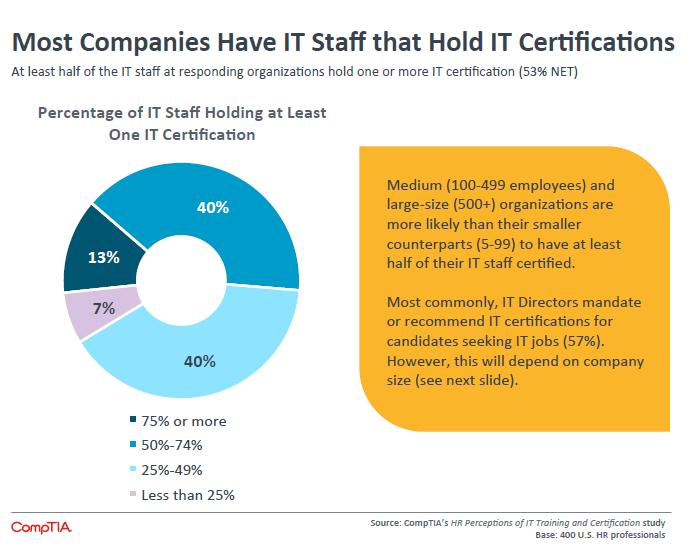

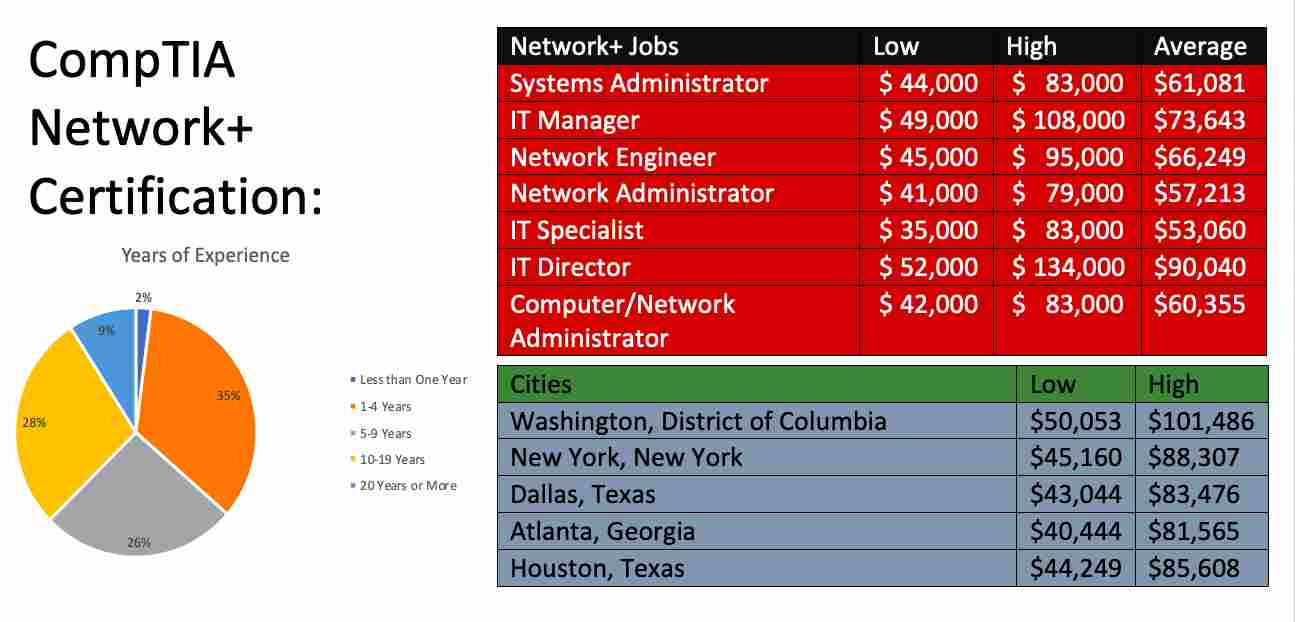
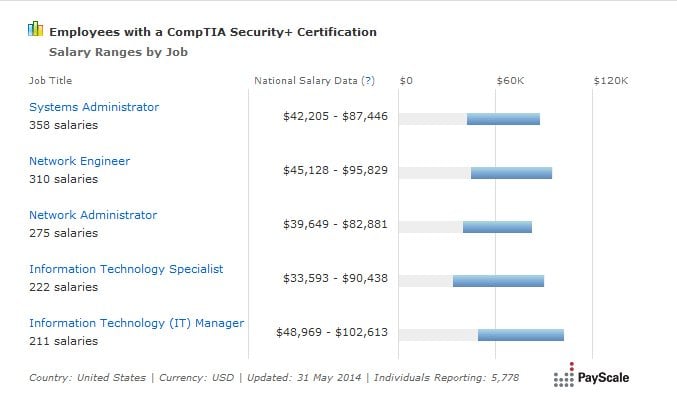
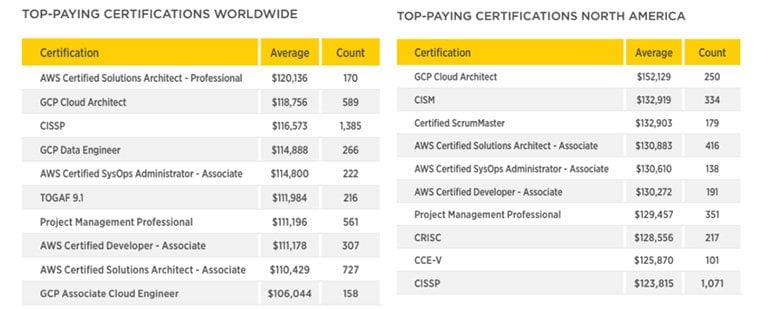
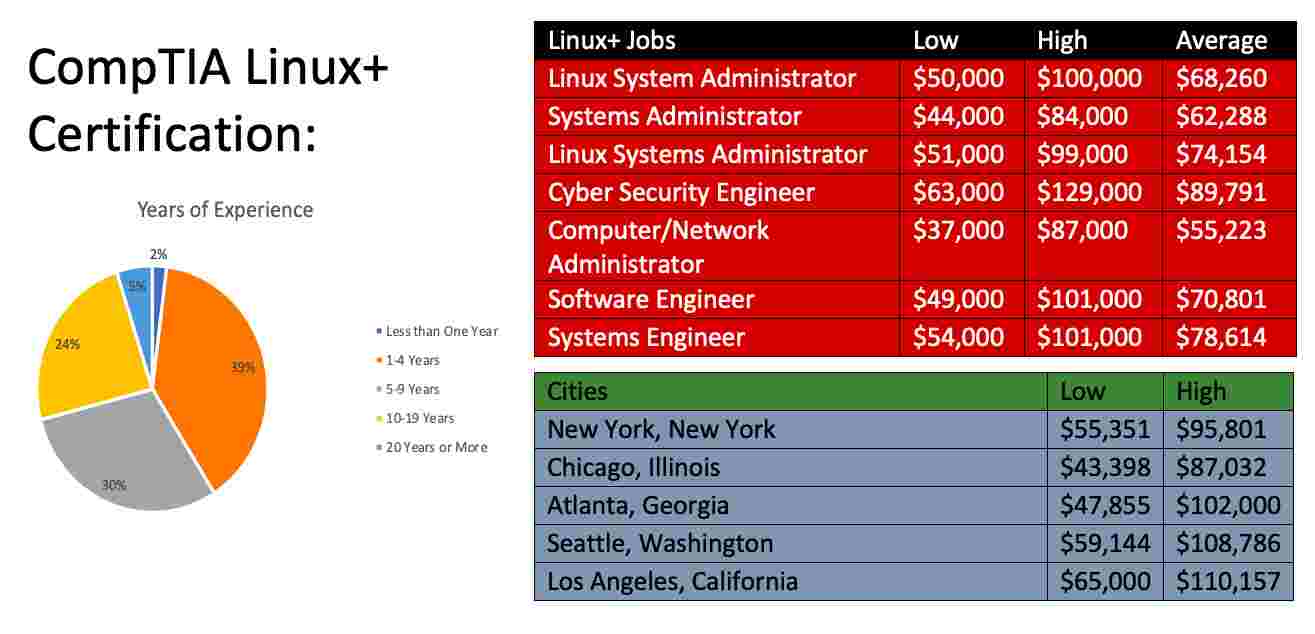



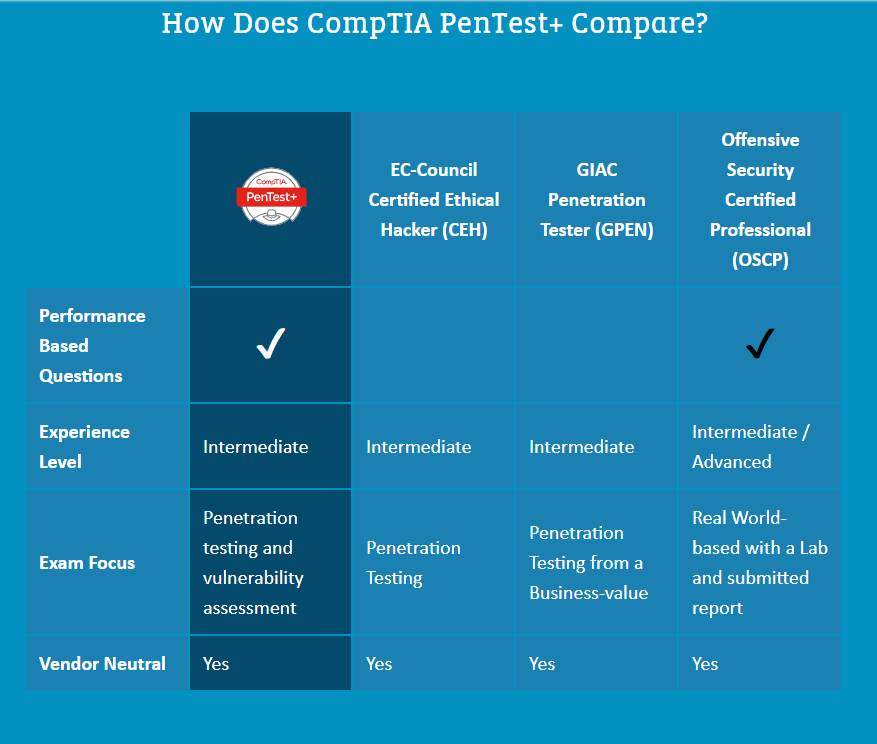
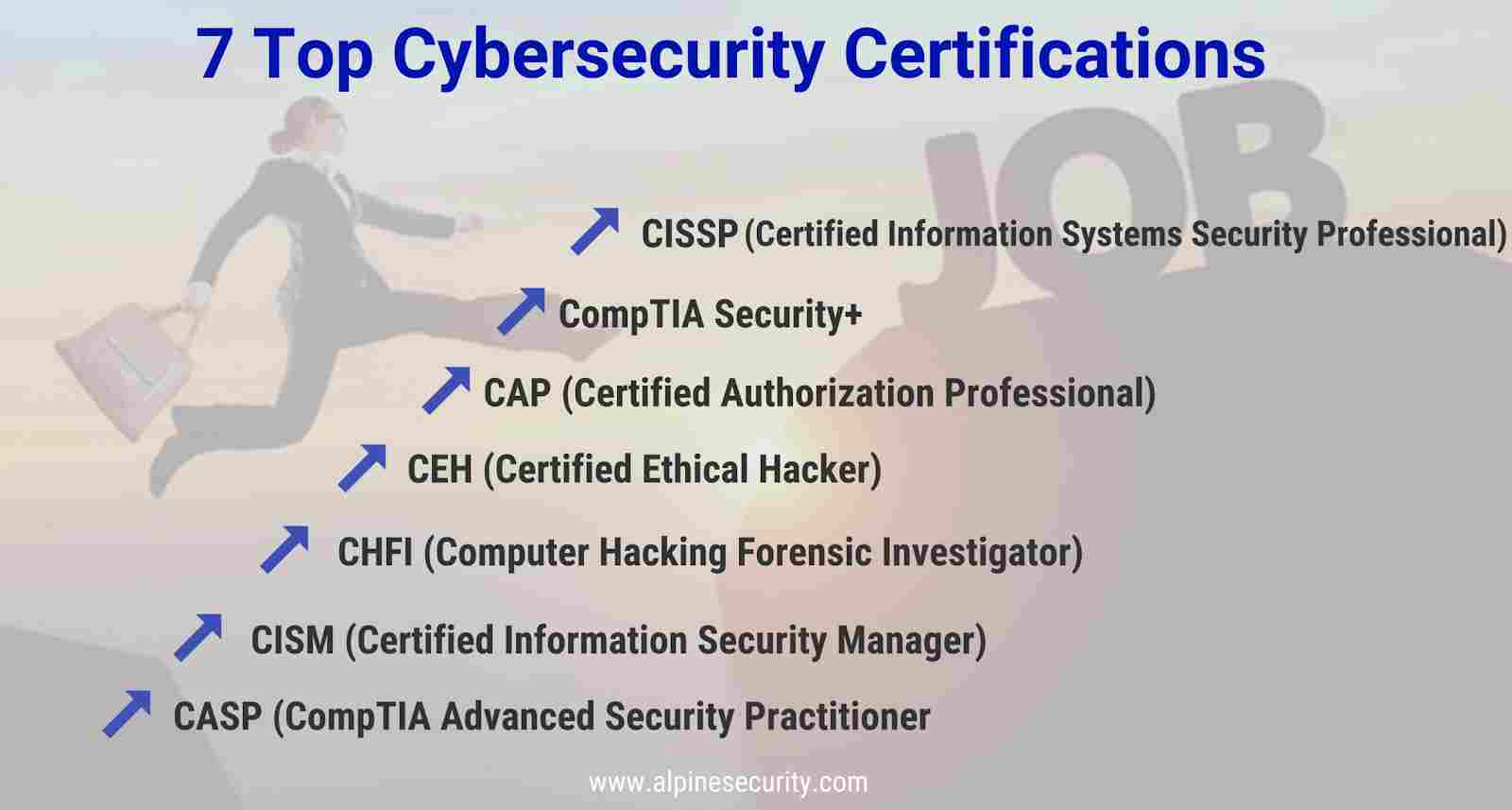
_11zon.png)
